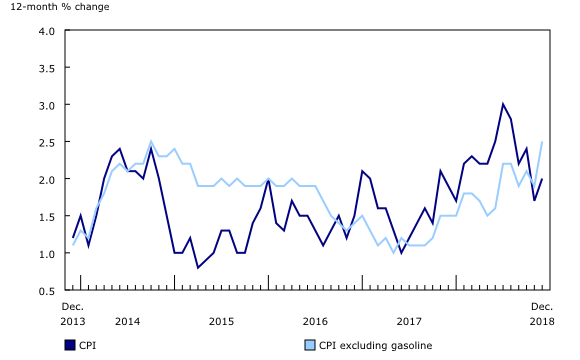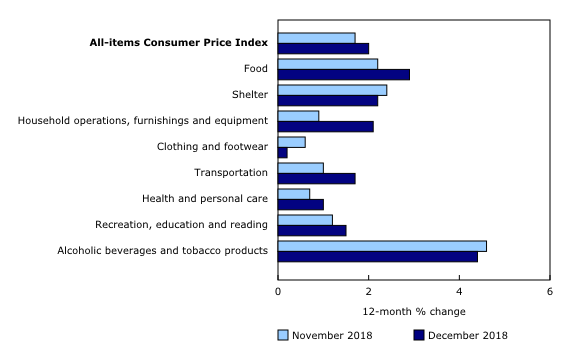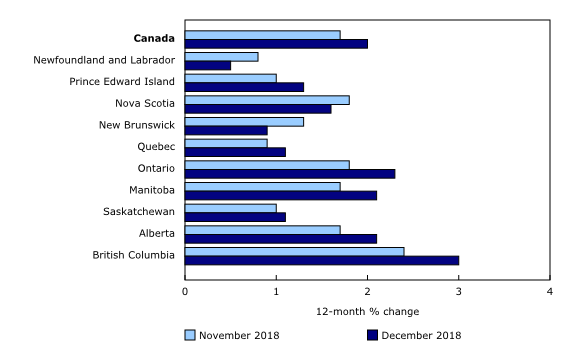Consumer Price Index, December 2018
Archived Content
Information identified as archived is provided for reference, research or recordkeeping purposes. It is not subject to the Government of Canada Web Standards and has not been altered or updated since it was archived. Please "contact us" to request a format other than those available.
Released: 2019-01-18
December 2018
2.0% 
(12-month change)
The Consumer Price Index (CPI) rose 2.0% on a year-over-year basis in December, following a 1.7% increase in November. Lower energy prices were offset by higher prices for various services, including air transportation, telephone services and travel tours. Excluding gasoline, the CPI rose 2.5% in December.
Component highlights
All eight major components rose year over year in December, with the shelter index (+2.2%) contributing most to the increase.
Consumer prices for services rose 3.5% on a year-over-year basis in December, following a 2.7% increase in November. A month-over-month increase in the air transportation index (+21.7%) reflected higher prices for travel during the holiday season. Consumers paid 6.1% more for telephone services compared with December 2017, when a series of industry-wide price promotions temporarily offered significantly lower prices. The travel tours index rose 6.6% year over year, following a 0.5% increase in November. Prices for passenger vehicle insurance premiums (+5.1%) continued to rise in December, extending a series of rate increases.
The price of energy products (-3.7%) continued to decline year over year in December. As crude oil prices continued to fall amid a global supply glut, consumers paid 8.6% less for gasoline in December compared with December 2017. Natural gas prices declined 4.1% year over year.
Regional highlights
Prices rose more on a year-over-year basis in seven provinces in December compared with the previous month. Prices for fuel oil and other fuels increased less on a year-over-year basis in December (+5.6%) than in November (+17.0%), reflecting lower crude oil prices. This deceleration in the fuel oil and other fuels index moderated growth in the all-items CPI in Atlantic Canada, where fuel oil is more commonly used for home heating.
Among the provinces, British Columbia (+3.0%) posted the largest year-over-year increase in the CPI in December. On a year-over-year basis, consumers in British Columbia paid more for gasoline in December (+1.7%) than in November (+0.8%) amid a supply disruption following a temporary pipeline closure. In all other provinces, gasoline prices declined year over year.
Consumer prices in Quebec rose 1.1% on a year-over-year basis, after a 0.9% increase in November. Among the provinces, prices for fresh vegetables (+20.7%) rose the most in Quebec.
Seasonally adjusted monthly Consumer Price Index
On a seasonally adjusted monthly basis, the CPI rose 0.2% in December, following a 0.1% decline in November. The food index (+0.6%) and the health and personal care index (+0.6%) posted the largest increases, while the transportation index (-0.1%) declined.
Note to readers
Upcoming methodological change: New approach for estimating the rent index
The Consumer Price Index (CPI) measures the change in prices of consumer goods and services over time. To accurately reflect trends in the market and in consumer behaviour, Statistics Canada periodically reviews and updates the methods applied to various components of the CPI.
The release of the January 2019 CPI (to be published on February 27, 2019) will mark the implementation of methodological changes for the calculation of the rent index.
The rent index represents 6.17% of the 2015 CPI basket at link month (December 2016) and is part of shelter, one of the major CPI components.
Detailed documentation describing the new rent index approach will be available with the January 2019 CPI release on February 27, 2019.
Upcoming basket update
On February 27, 2019, with the release of the January 2019 Consumer Price Index (CPI), the basket of goods and services used in the calculation of the CPI will be updated. For more information on basket updates, consult The Canadian Consumer Price Index Reference Paper, chapter 8, 'Weights and Basket Updates'.
Air transportation index
Users are reminded that the methodology for the air transportation index was updated in March 2018 as part of the regular review of the CPI methodology. Interpretation of the 12-month price change indicator should be made with caution, particularly in the year following the implementation of the new methodology.
Real-time data tables
Real-time data table 18-10-0259-01 will be updated on February 4.
Next release
The Consumer Price Index for January will be released on February 27.
Products
More information about the concepts and use of the Consumer Price Index (CPI) is available in The Canadian Consumer Price Index Reference Paper (62-553-X).
For information on the history of the CPI in Canada, consult the publication Exploring the First Century of Canada's Consumer Price Index (62-604-X).
Two videos, "An Overview of Canada's Consumer Price Index (CPI)" and "The Consumer Price Index and Your Experience of Price Change," are available on Statistics Canada's YouTube channel.
Contact information
For more information, or to enquire about the concepts, methods or data quality of this release, contact us (toll-free 1-800-263-1136; 514-283-8300; STATCAN.infostats-infostats.STATCAN@canada.ca) or Media Relations (613-951-4636; STATCAN.mediahotline-ligneinfomedias.STATCAN@canada.ca).
- Date modified:




